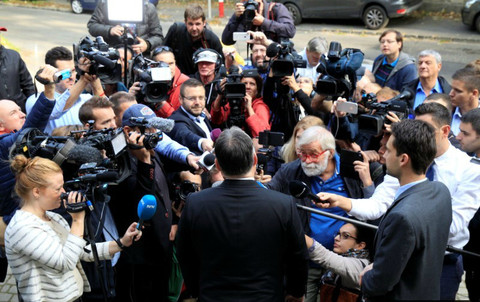By NIKOLAJ NIELSEN
BRUSSELS, 7. MAR, 17:59
Hungary's parliament passed a bill on Tuesday (7 March) to detain all asylum seekers in converted shipping containers amid allegations that some were beaten by border guards.
The new law lets authorities detain everyone in the camps along so-called transit zones near the border with Serbia.
It expands on legislation from last July that allowed authorities to apprehend and return anyone to Serbia caught within 8km of the Hungarian border.
Tuesday’s decision meant that anyone, regardless of their asylum status, would be locked up no matter where they were found in Hungary.
Some 19,000 people last year were sent back to Serbia or blocked from entering the country amid reports of beatings and abuse at the hands of Hungarian border guards.
A Hungarian spokeswoman told EUobserver by email that asylum seekers would only be able to leave the container camps if they received permission or if they volunteered to leave the country and return to Serbia.
"Illegal immigrants apprehended within the country’s territory will be escorted by police back through the nearest border gate, meaning that immigrants will be able to submit their asylum requests in the transit zone under controlled conditions," she said.
She said people would receive medical and other required care for the full length of their asylum proceedings.
De facto detention
The move was seen by Amnesty International, a British NGO, as a violation of people's right to claim asylum after having fled wars in places such as Syria and Iraq.
"This is de facto detention ordered without individual assessment, ordered without the necessary safeguards," Amnesty’s Todor Gardos said.
"It’s a punitive measure. People are being punished simply because they want to enter an asylum process," he said.
Hungary set up the transit zones near the borders in September 2015.
People detained there were in the past released after four weeks and then sent to reception centres.
"Now the Hungarian authorities have removed that four-week deadline and they have made this detention in this transit zone, in the blue containers, as the default option," said Gardos.
Two container sites are already operational along the border with Serbia.
Another two have been erected near Croatia with plans to build more. Each site will house up to 300 asylum seekers.
Only 50 people per week or so are being allowed to enter from Serbia to seek asylum.
The latest law follows recent pressure by the European Commission for EU states to lock up more people, including children, and for longer periods,.
Leaders at an EU summit in Brussels this week are to endorse the Commission's plans to fast-track migrant detentions and expulsions.
Zoltan Kovacs, Hungary's top spokesman, also told reporters in late February that the country had spent over €500 million on a border fence with Serbia.
He said that another €122 million had been earmarked for a second “smart fence” equipped with motion detection sensors.


